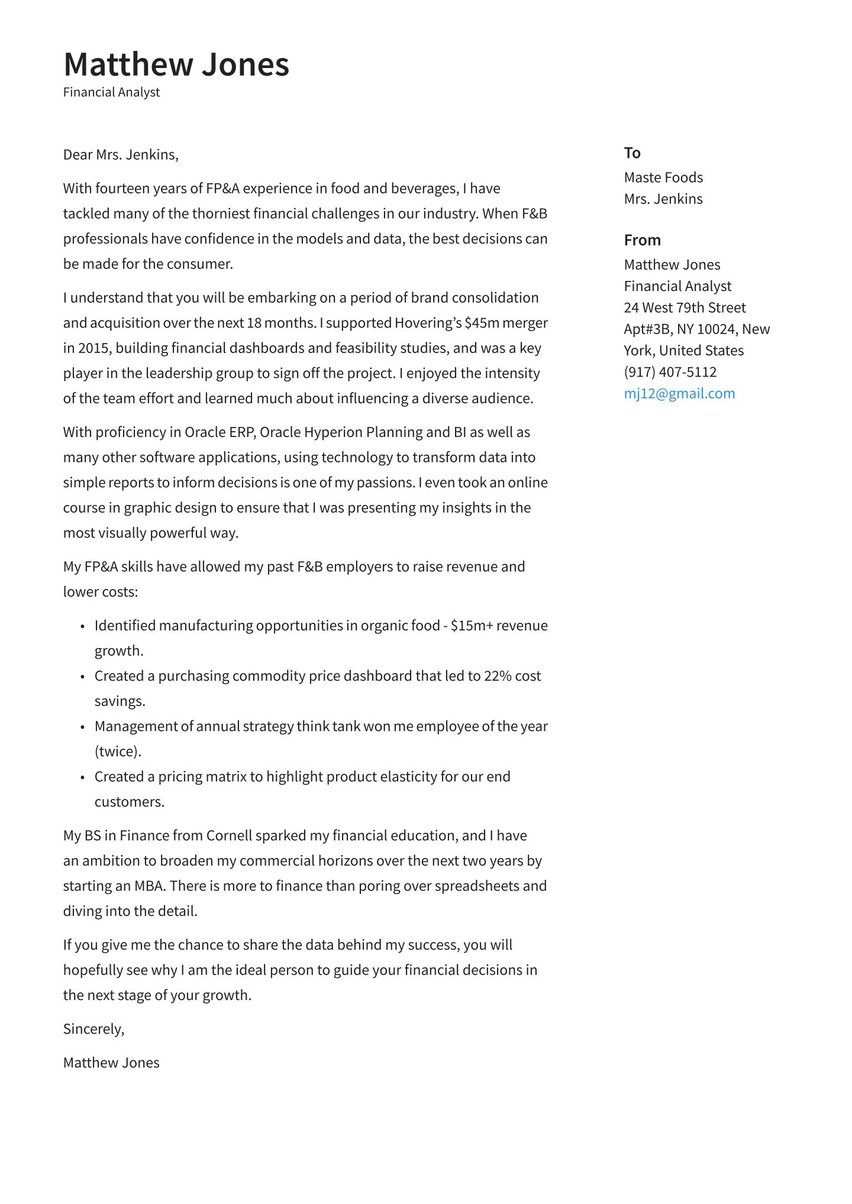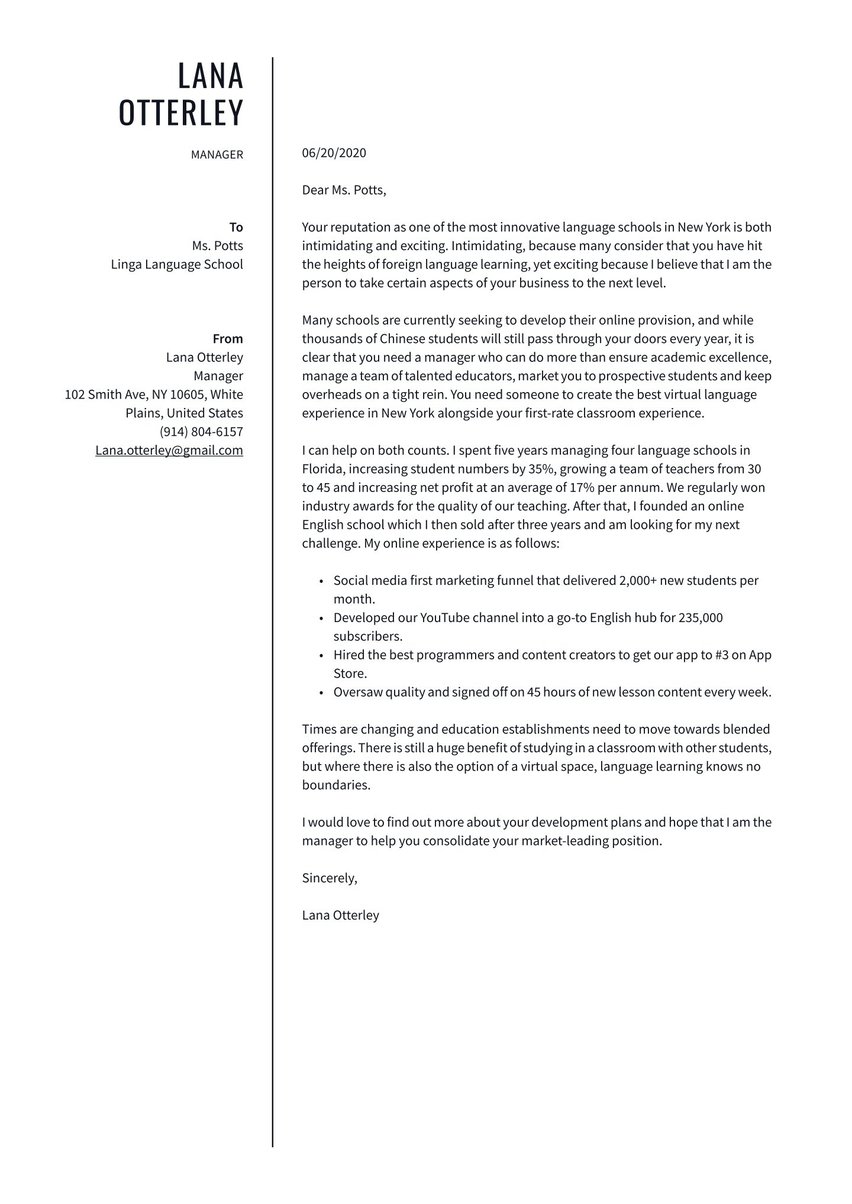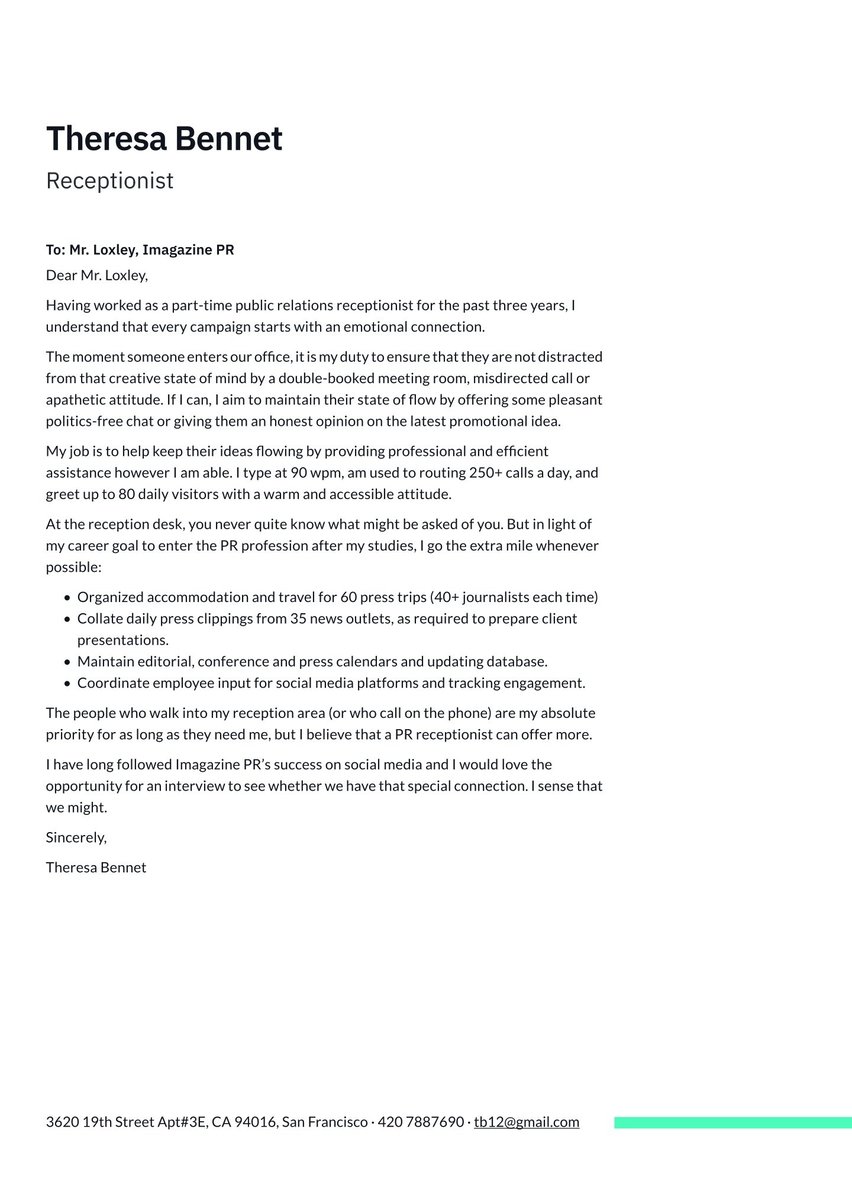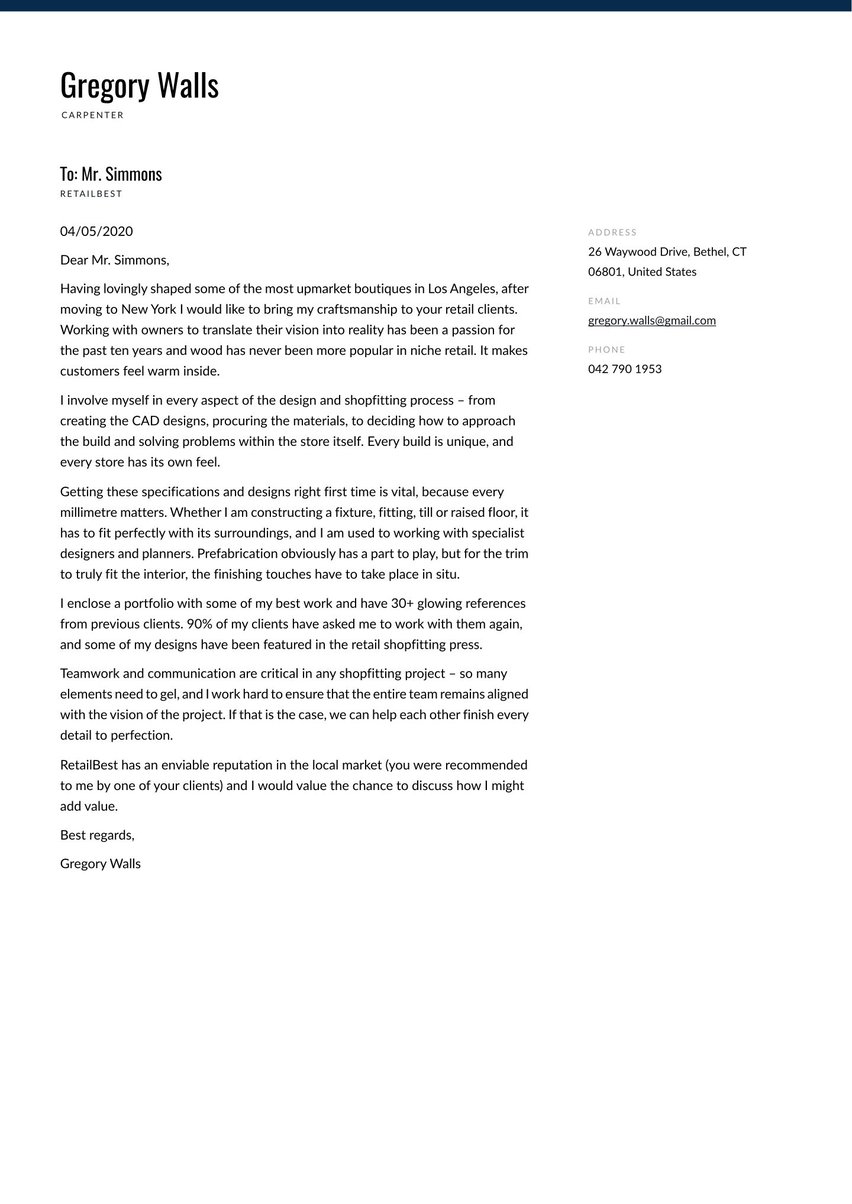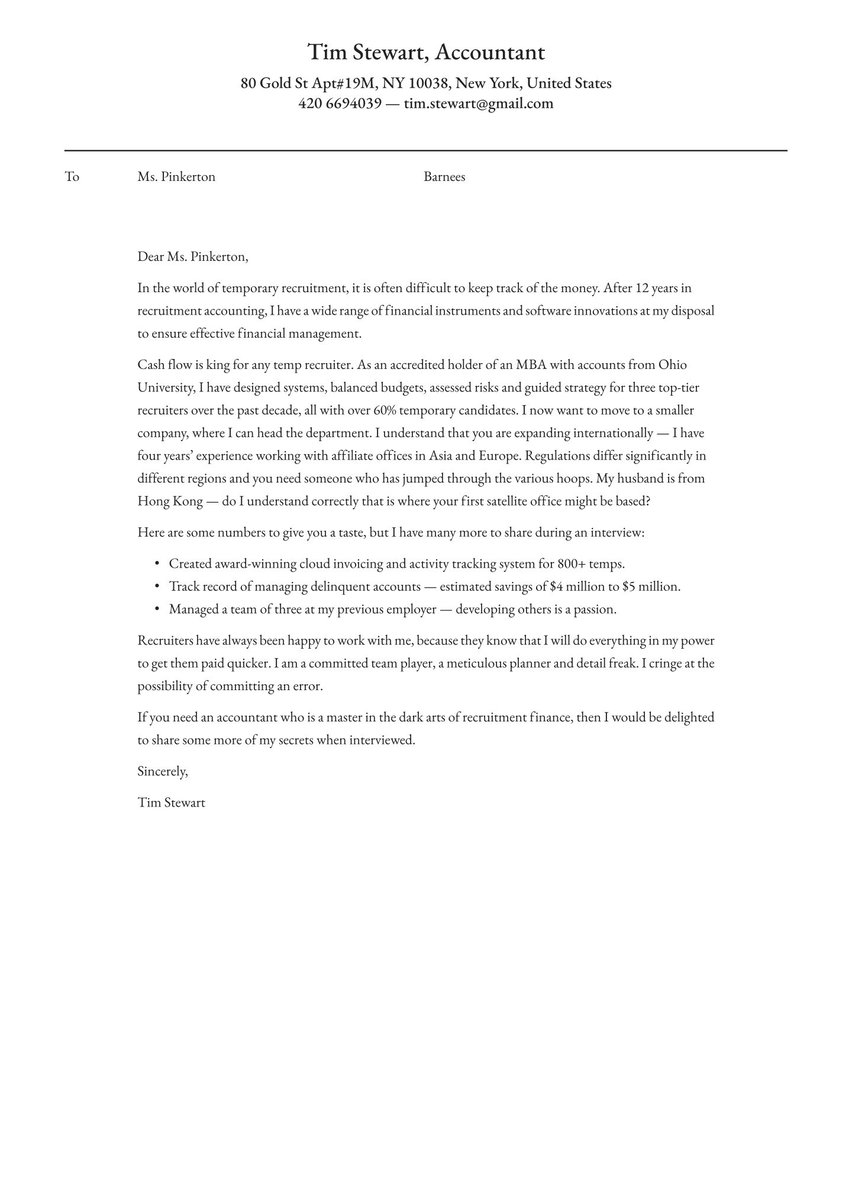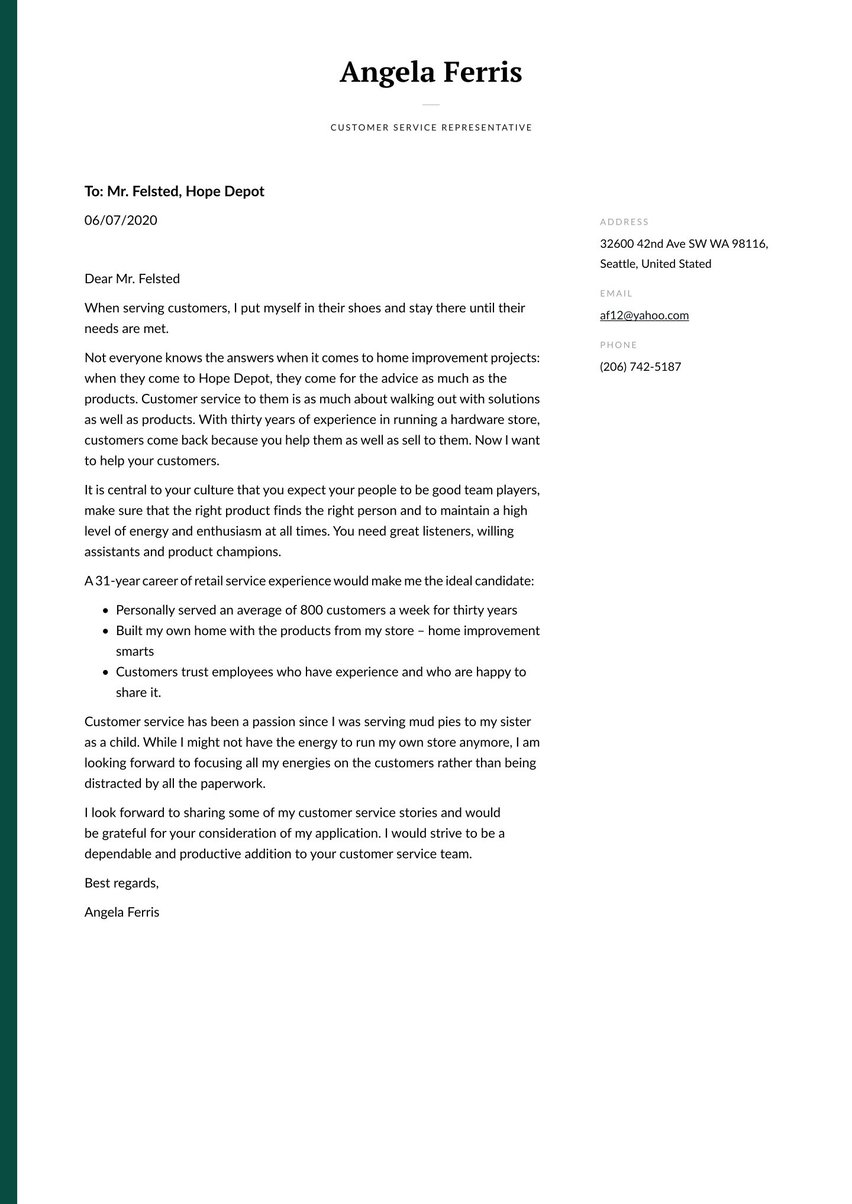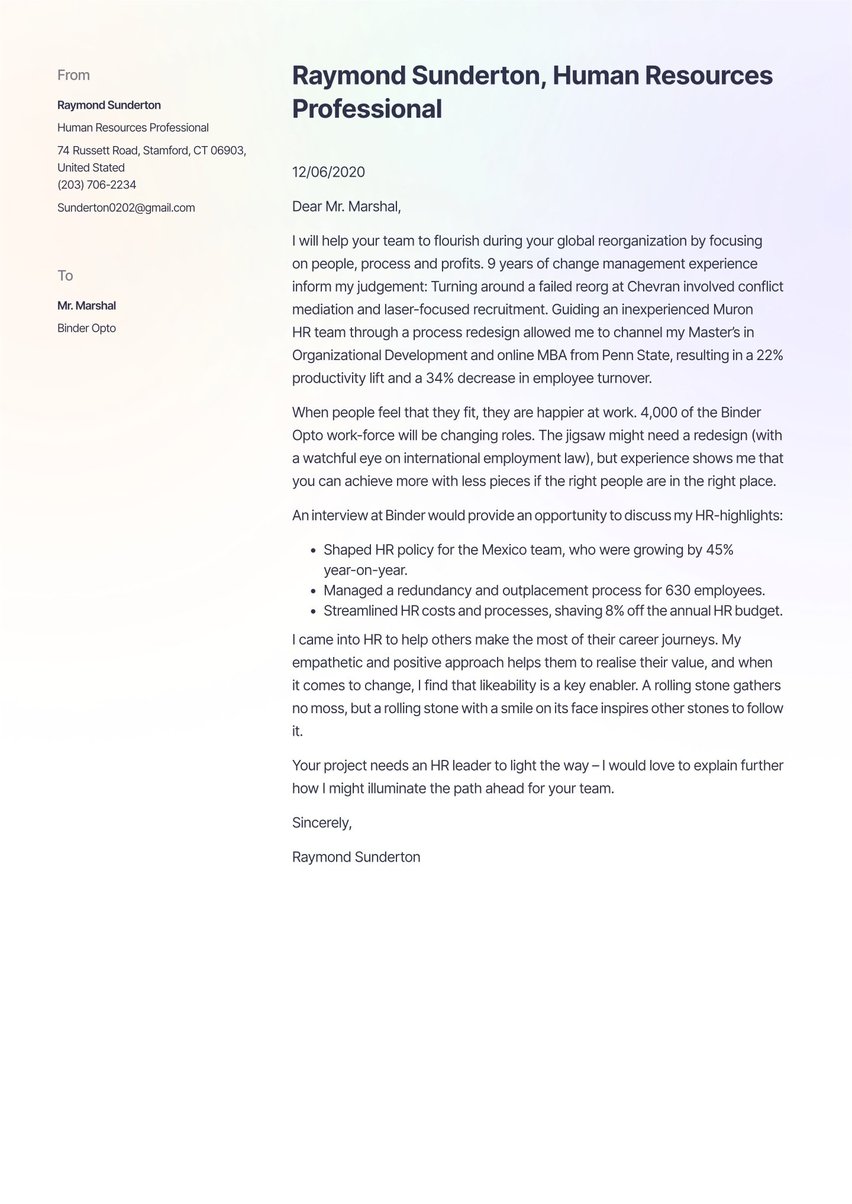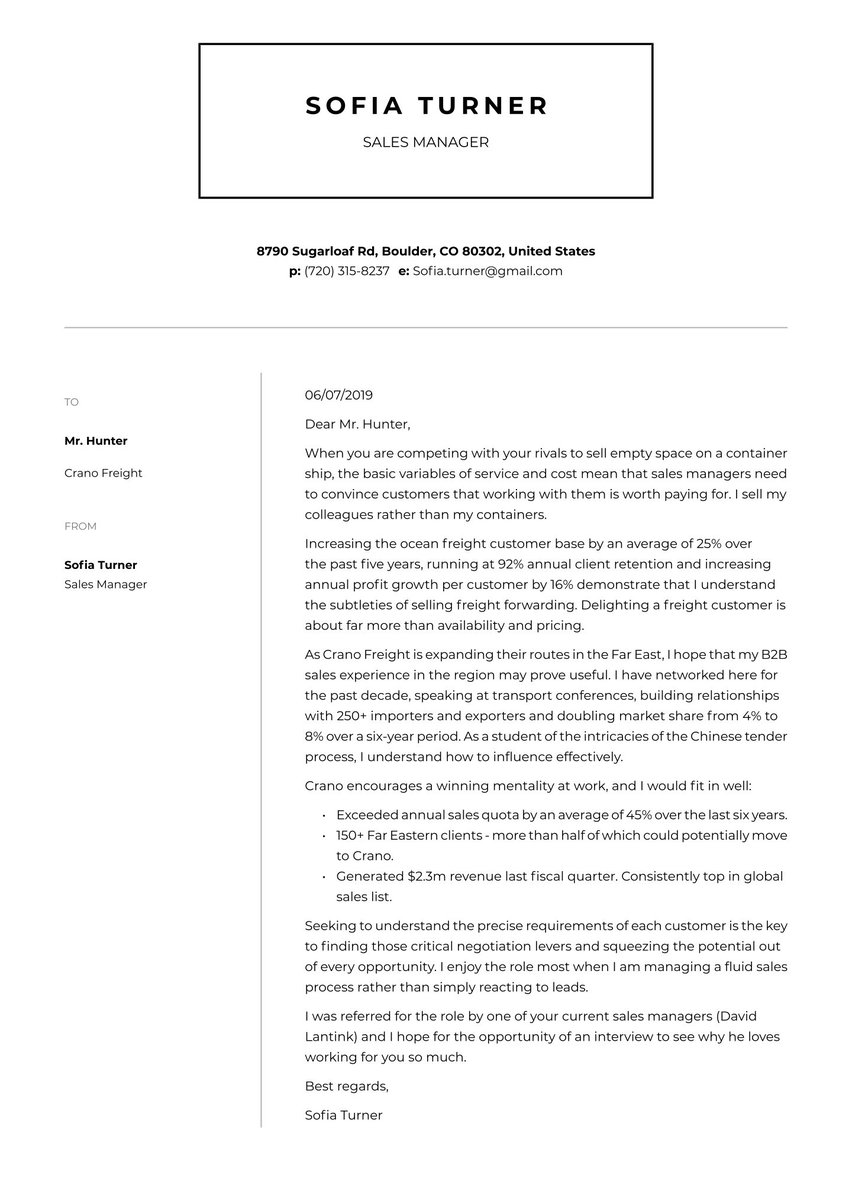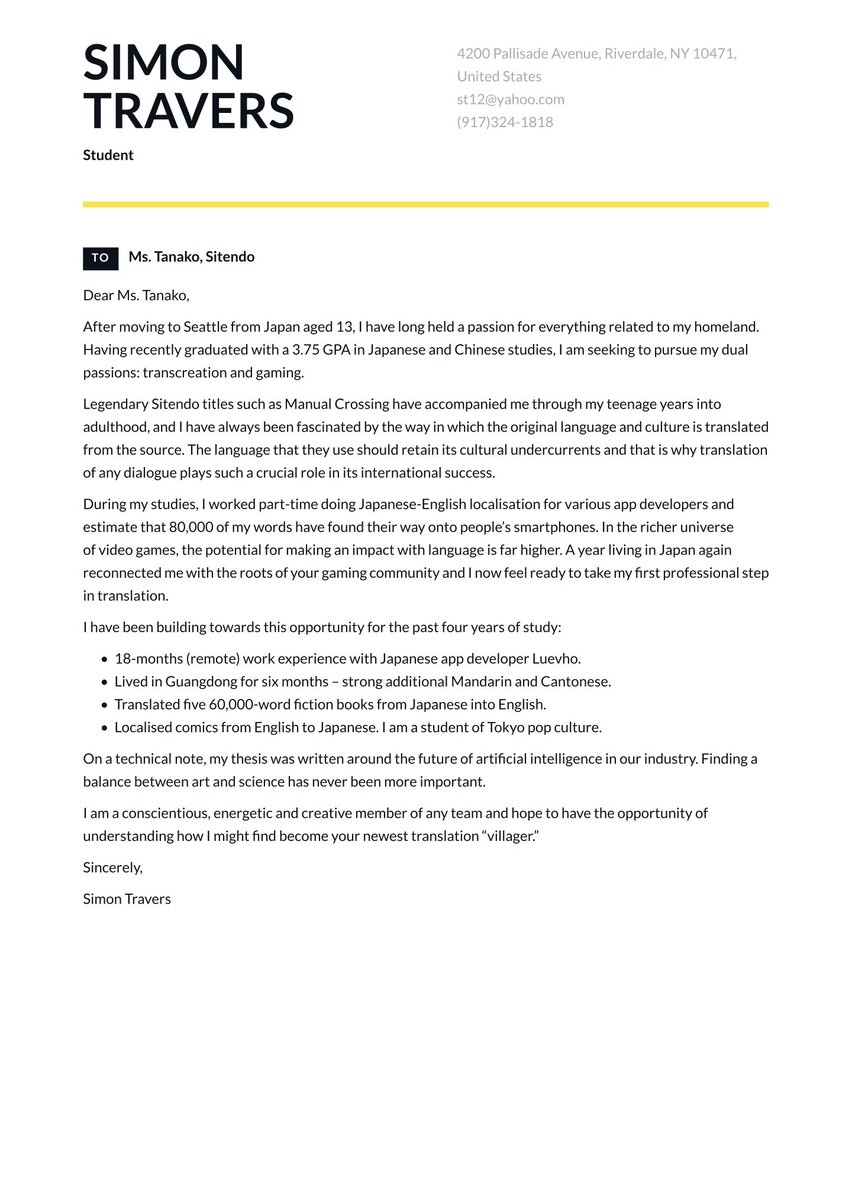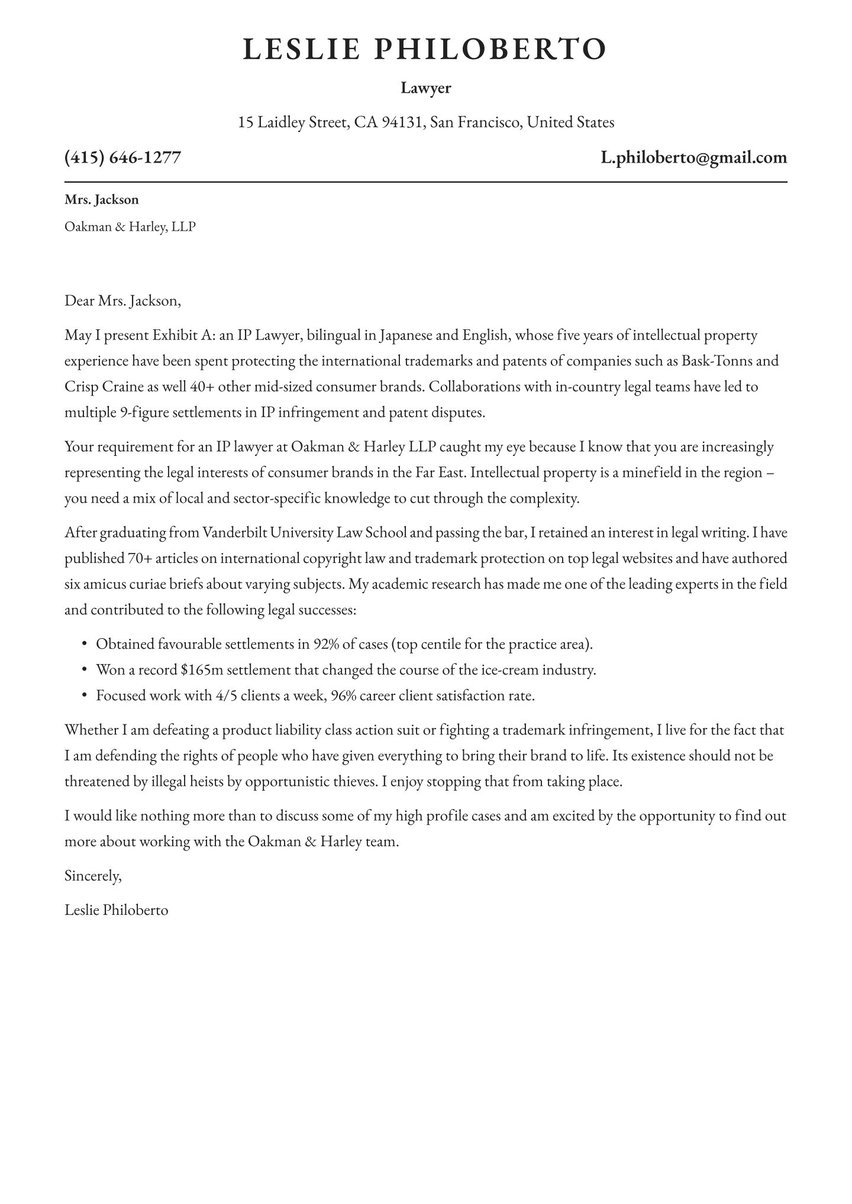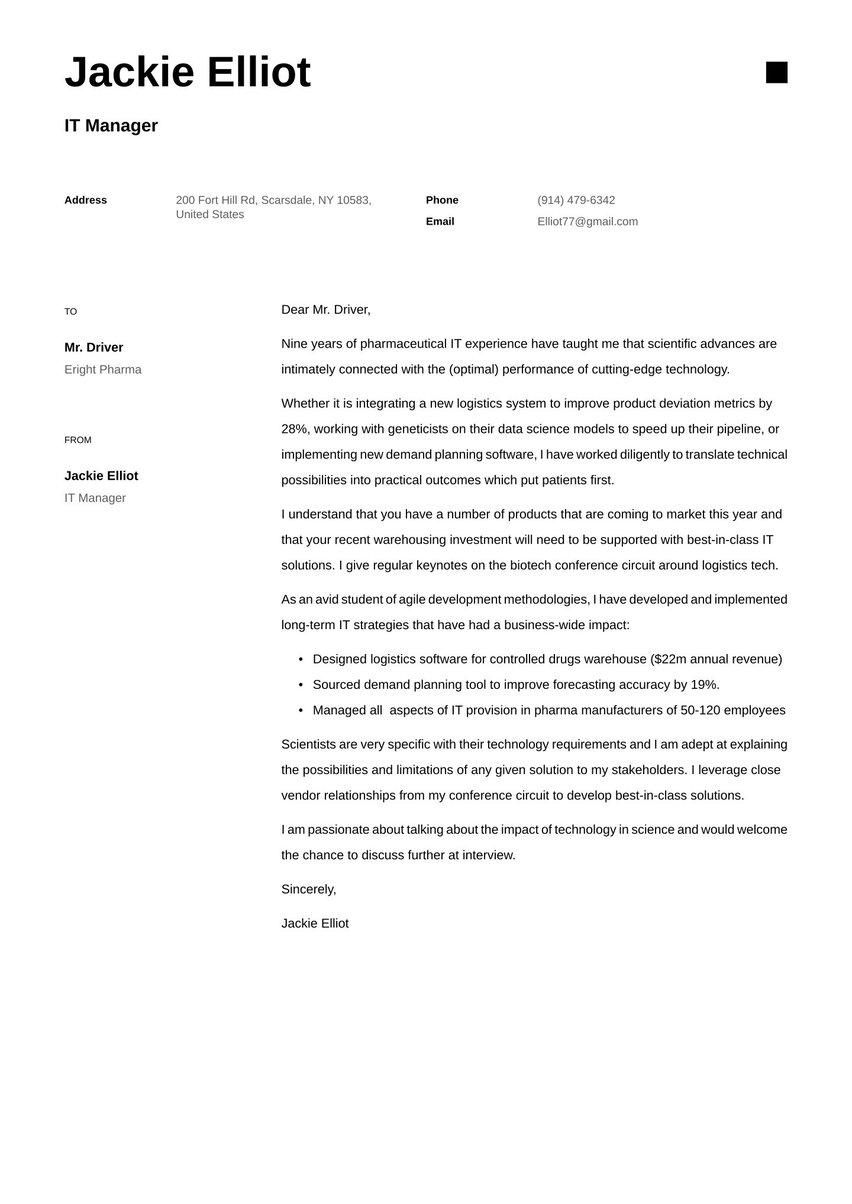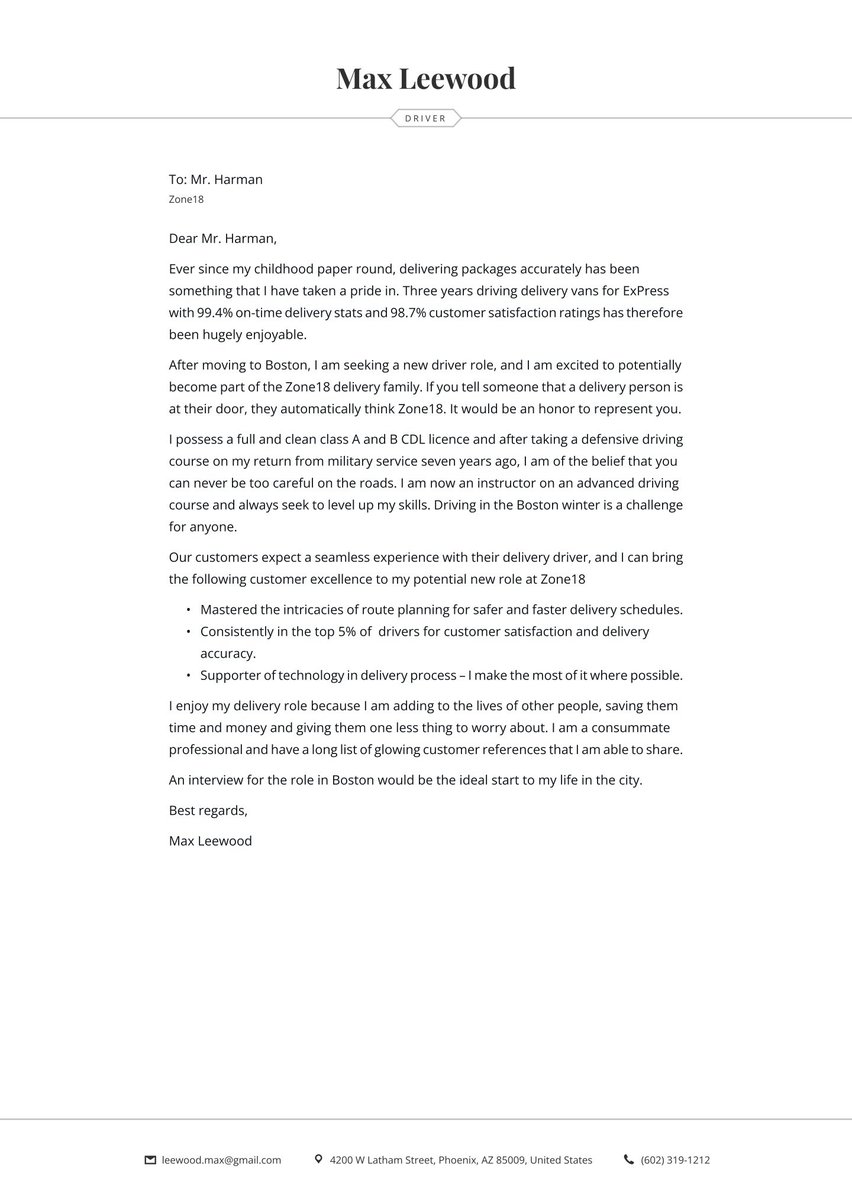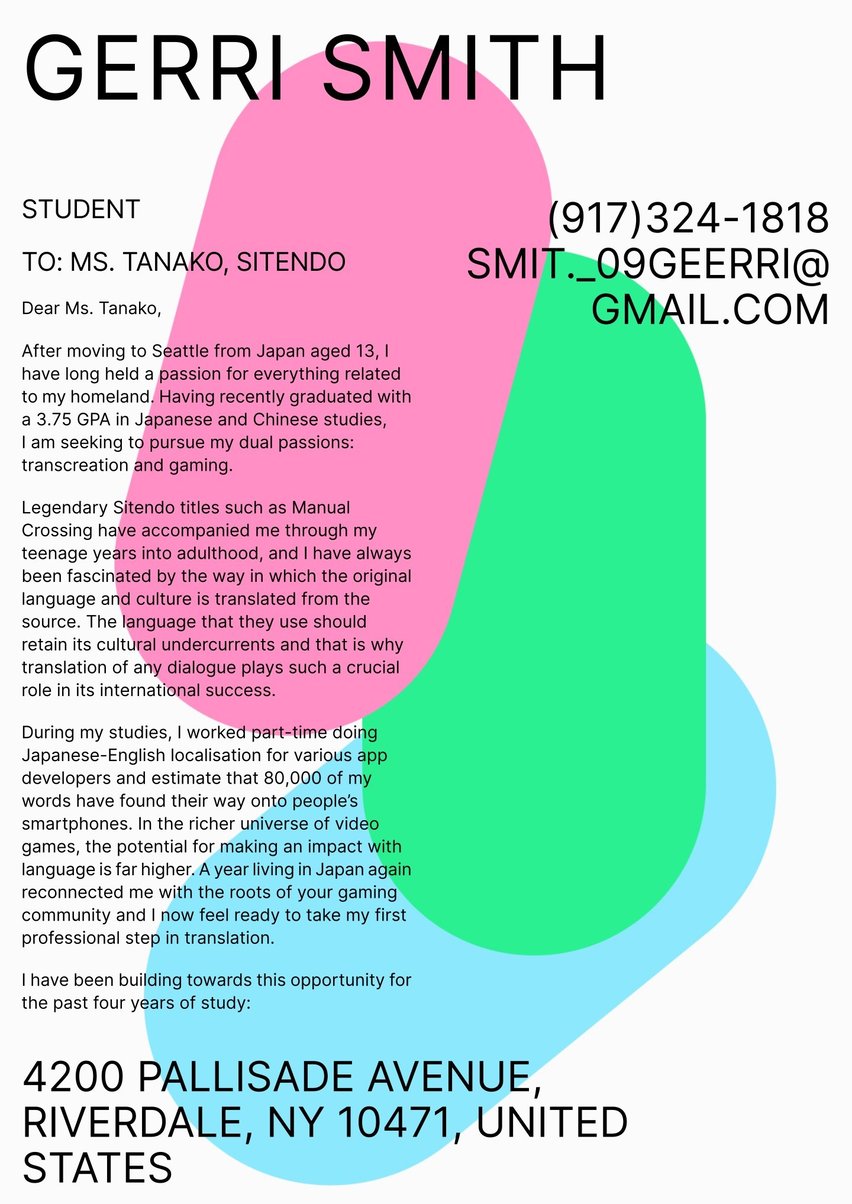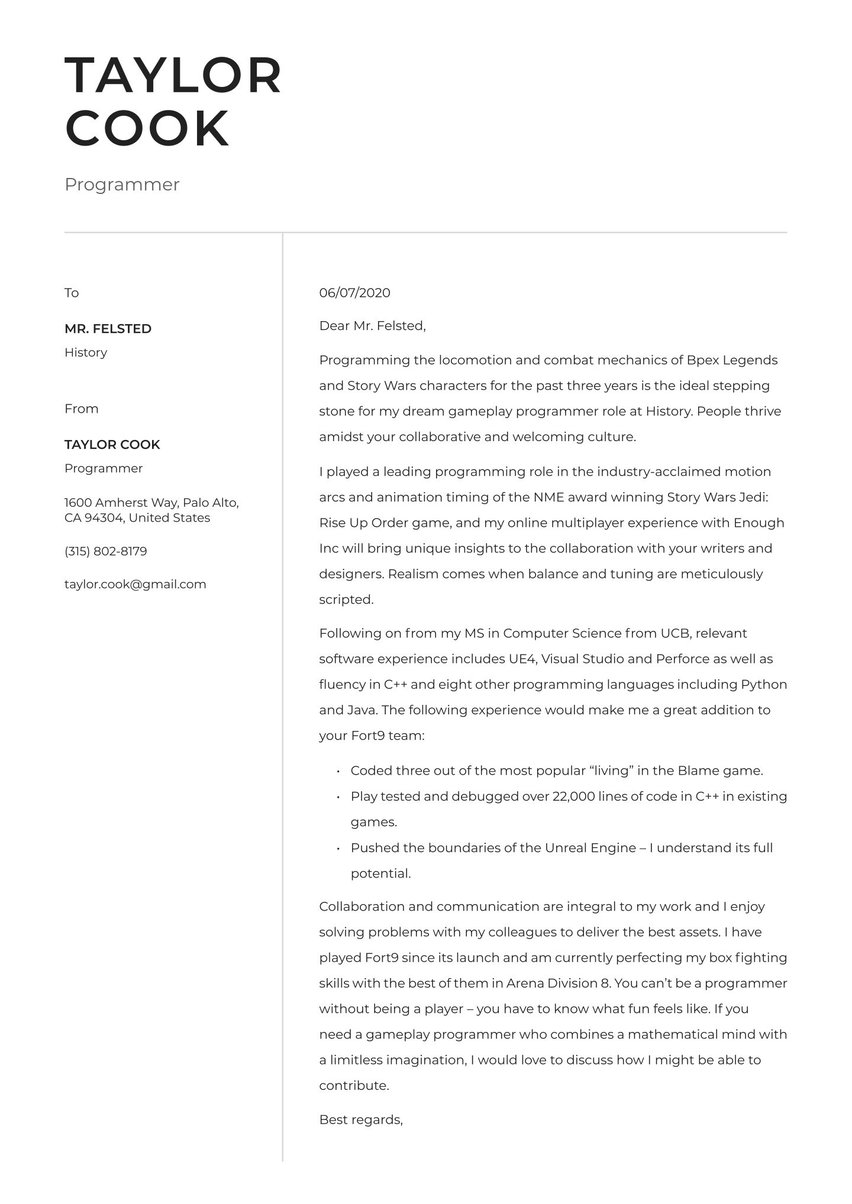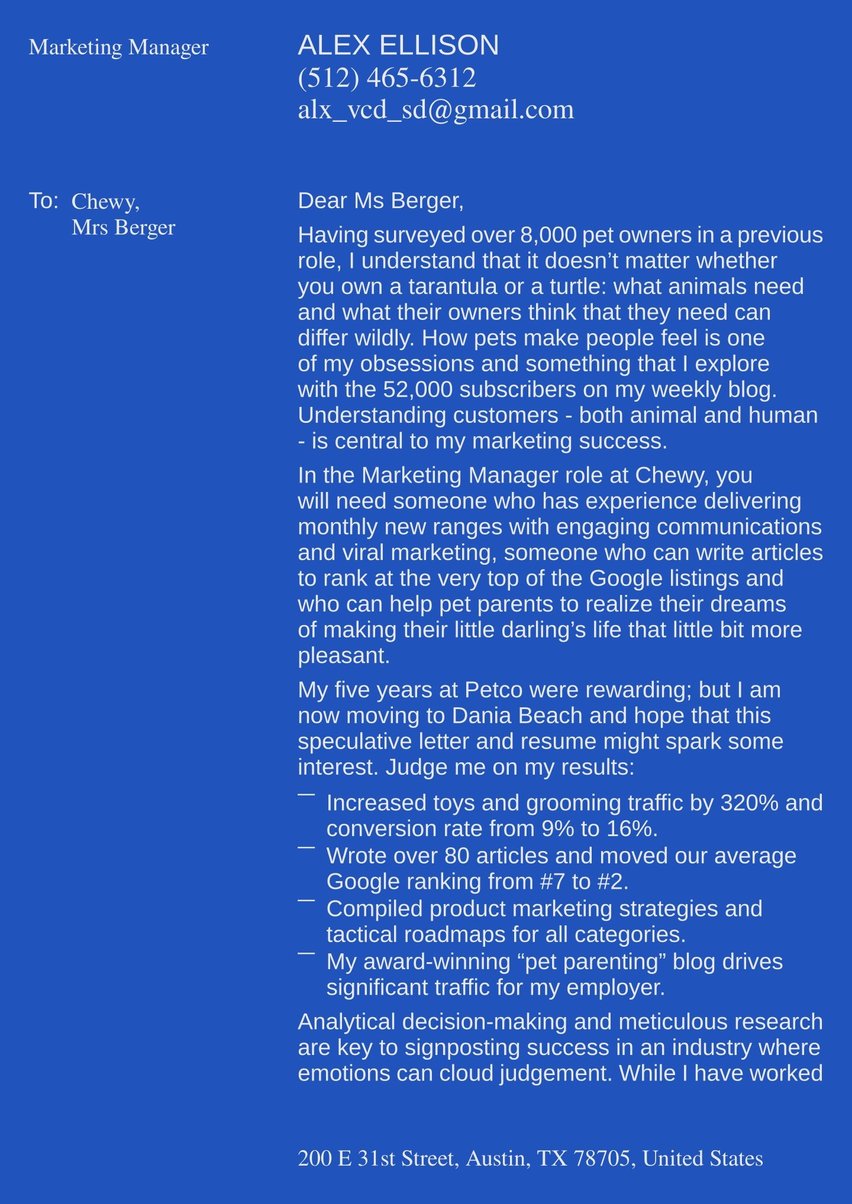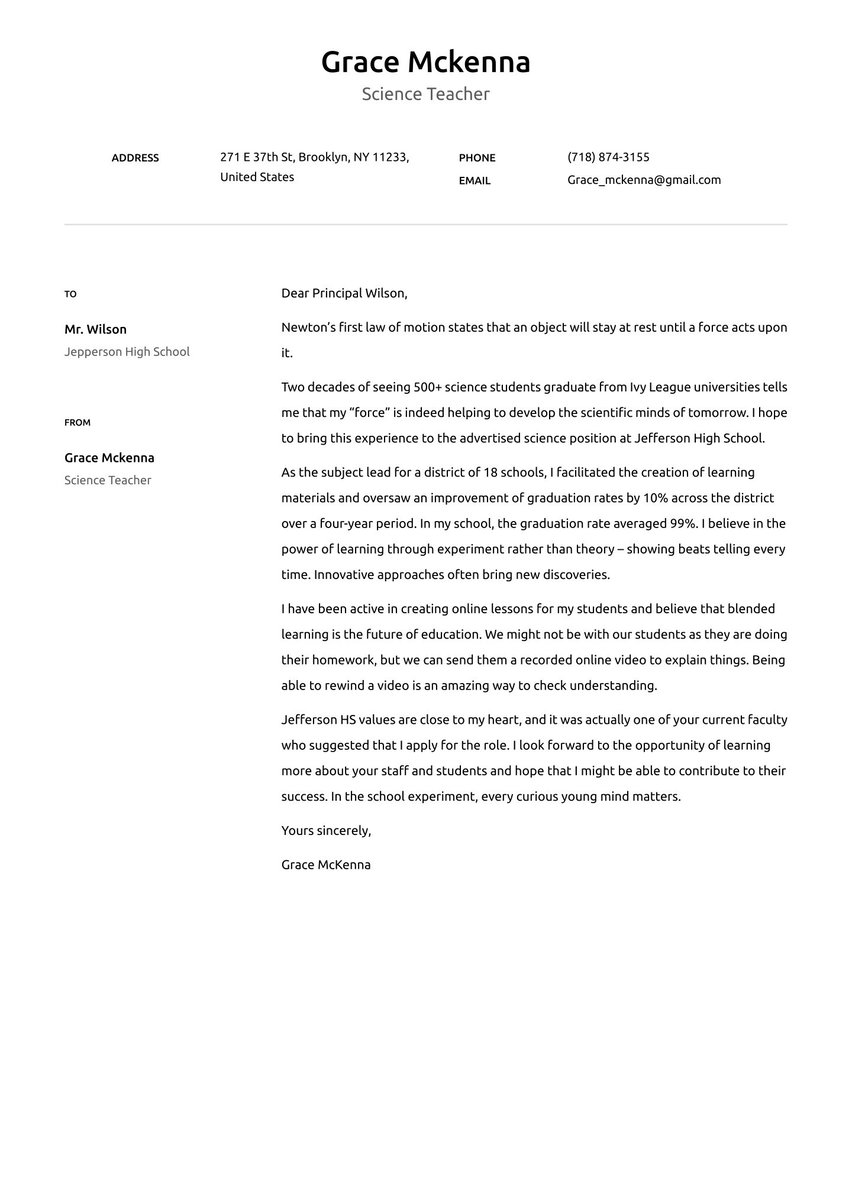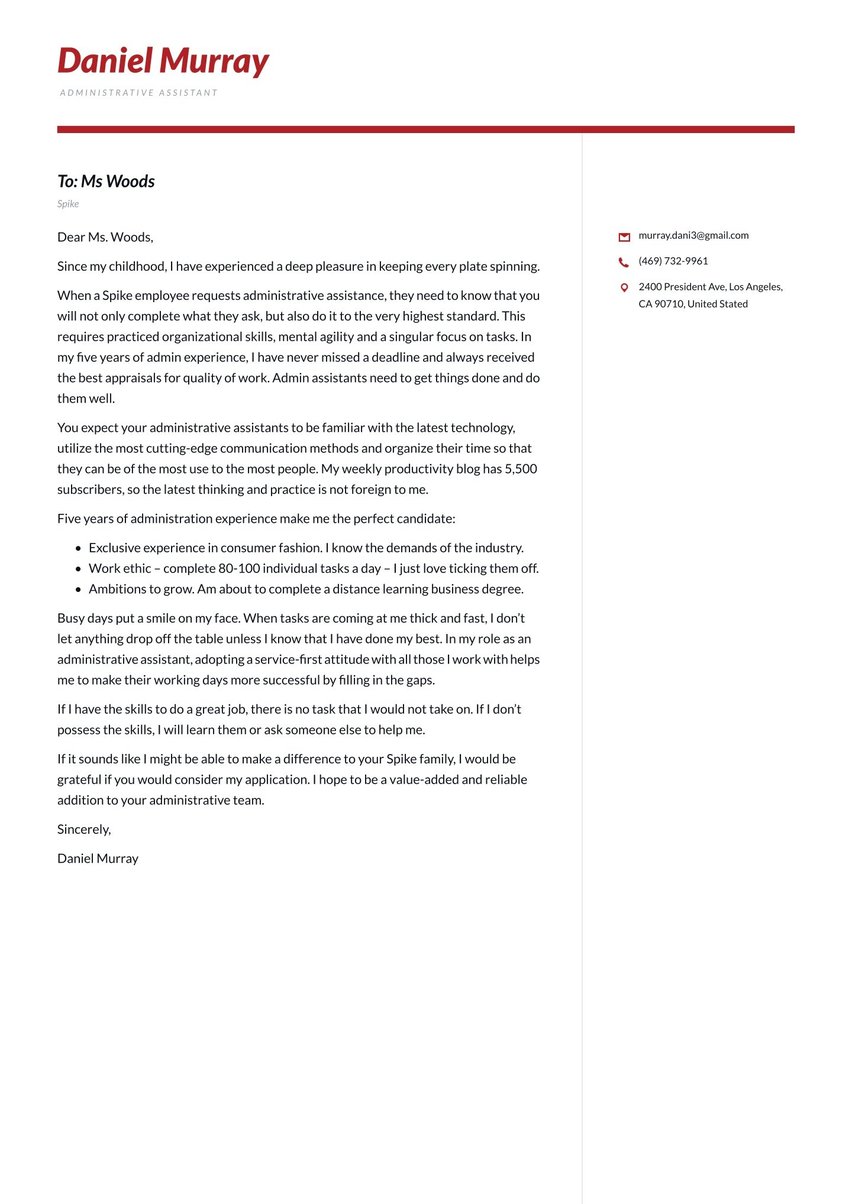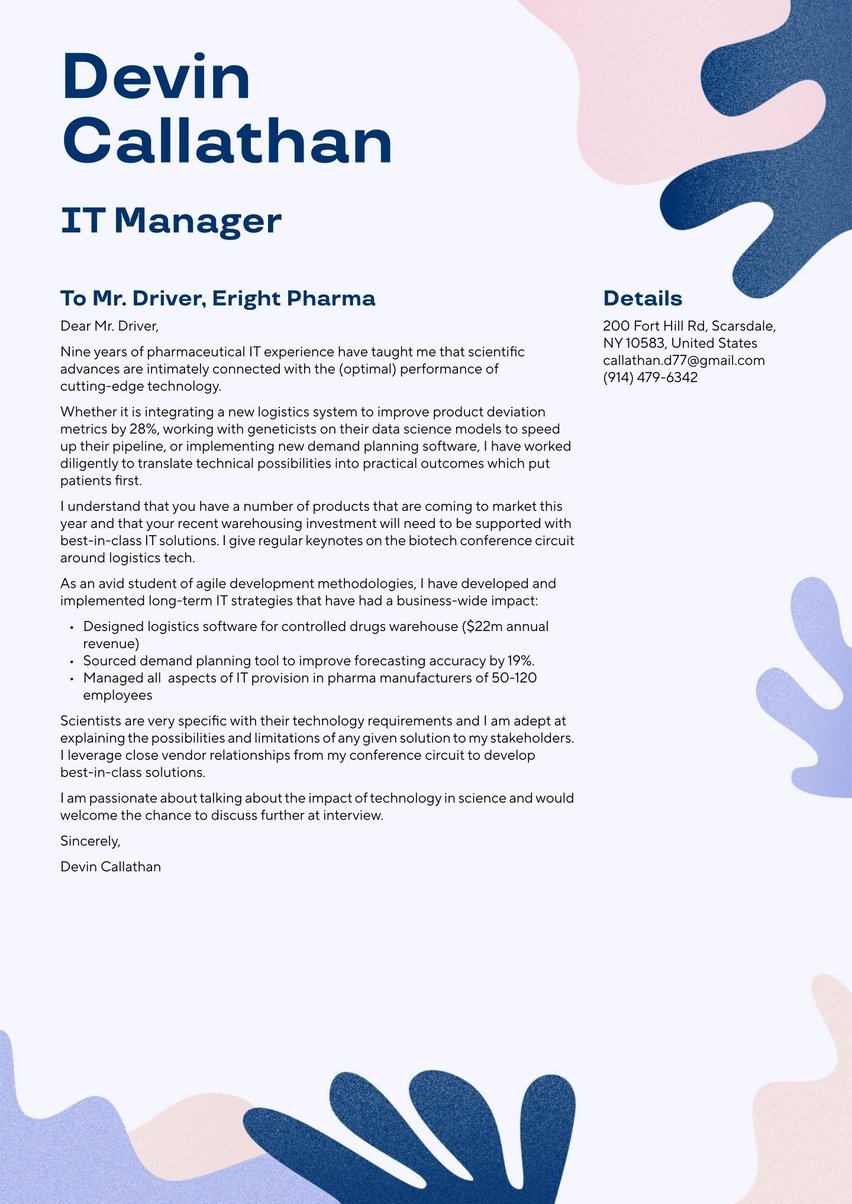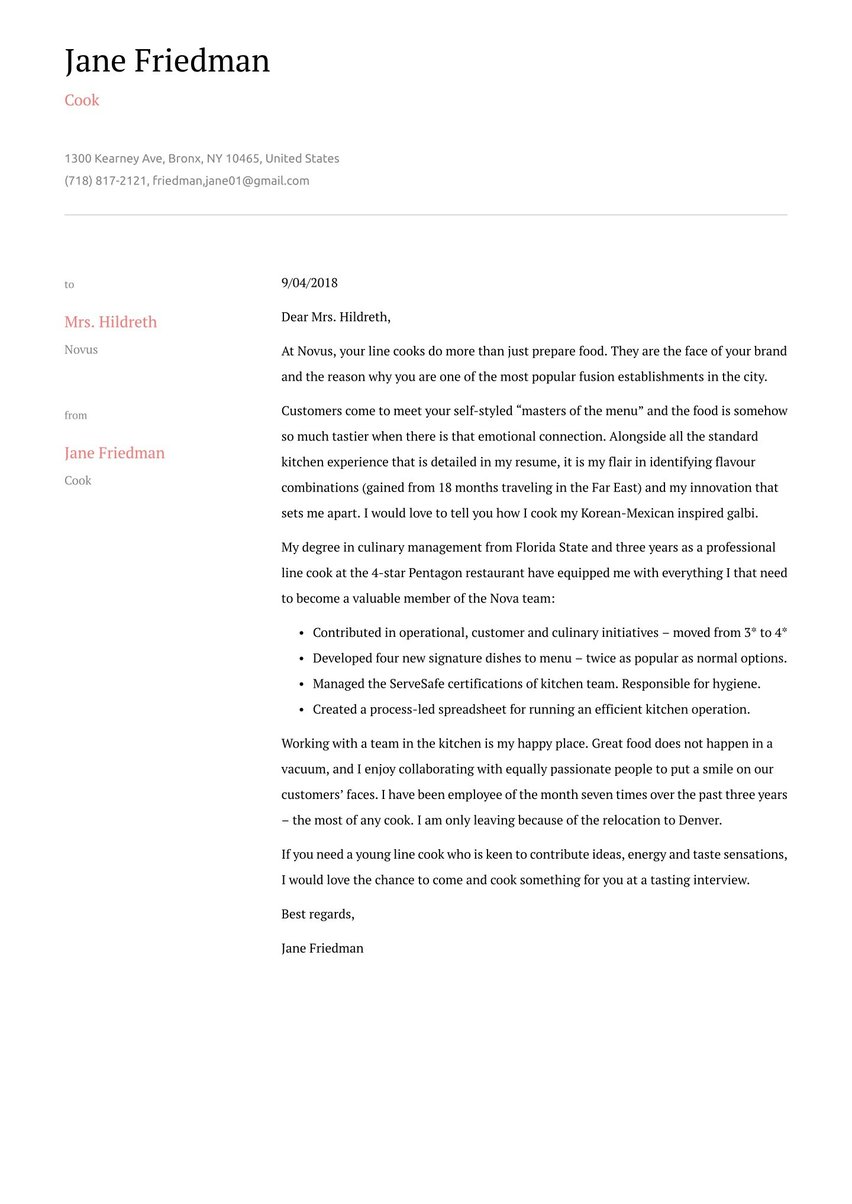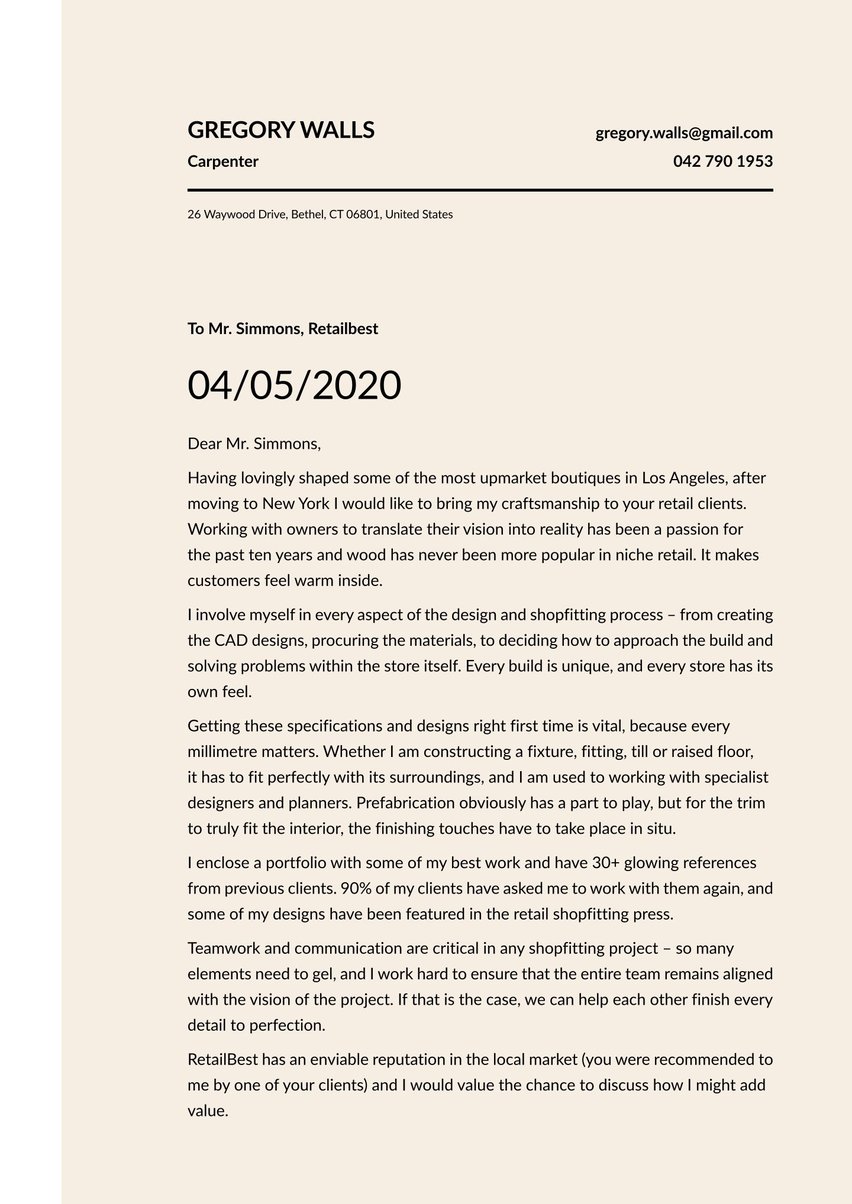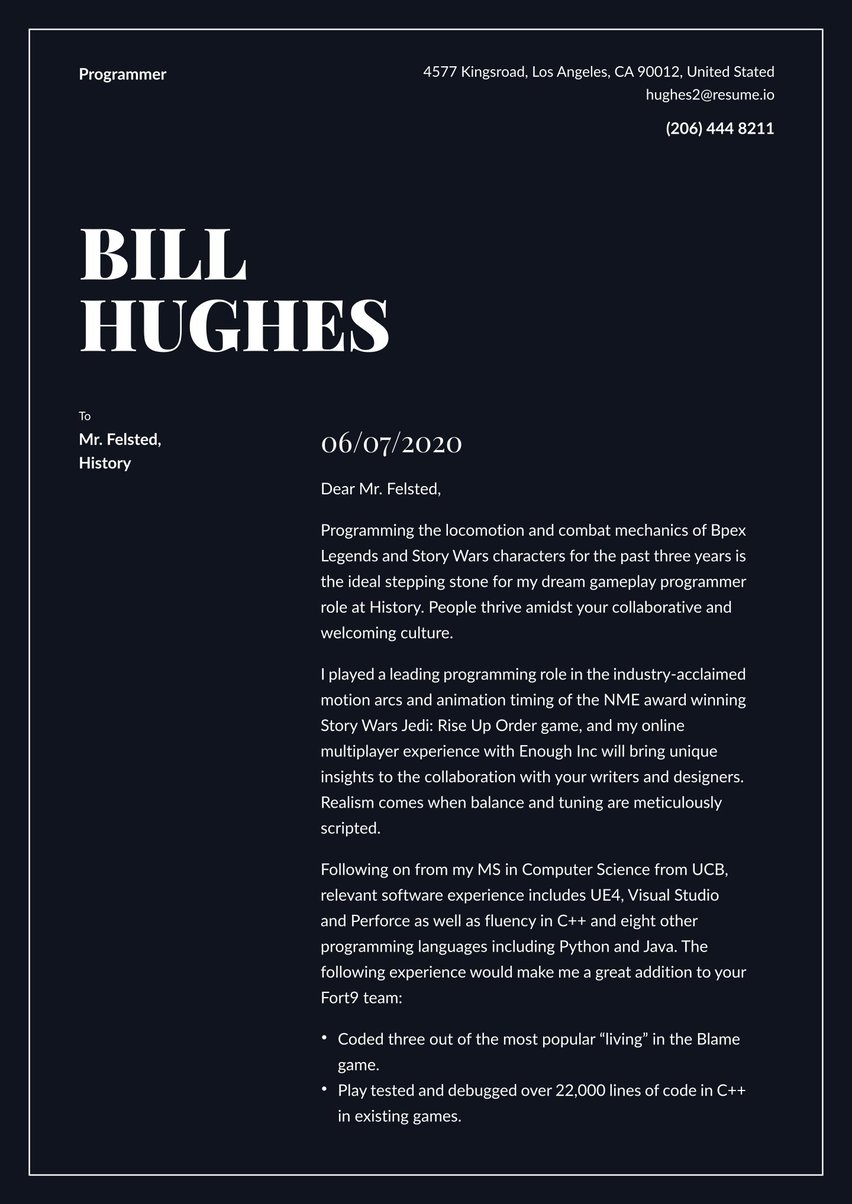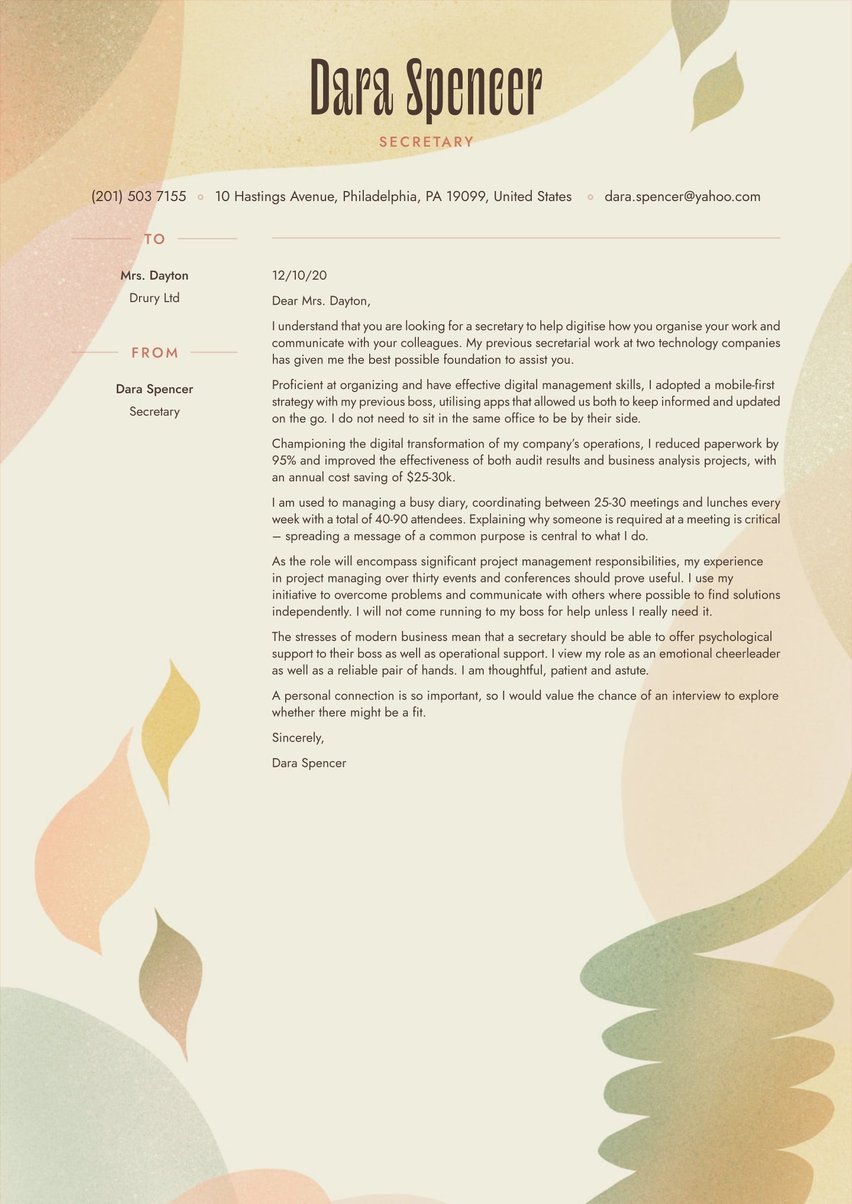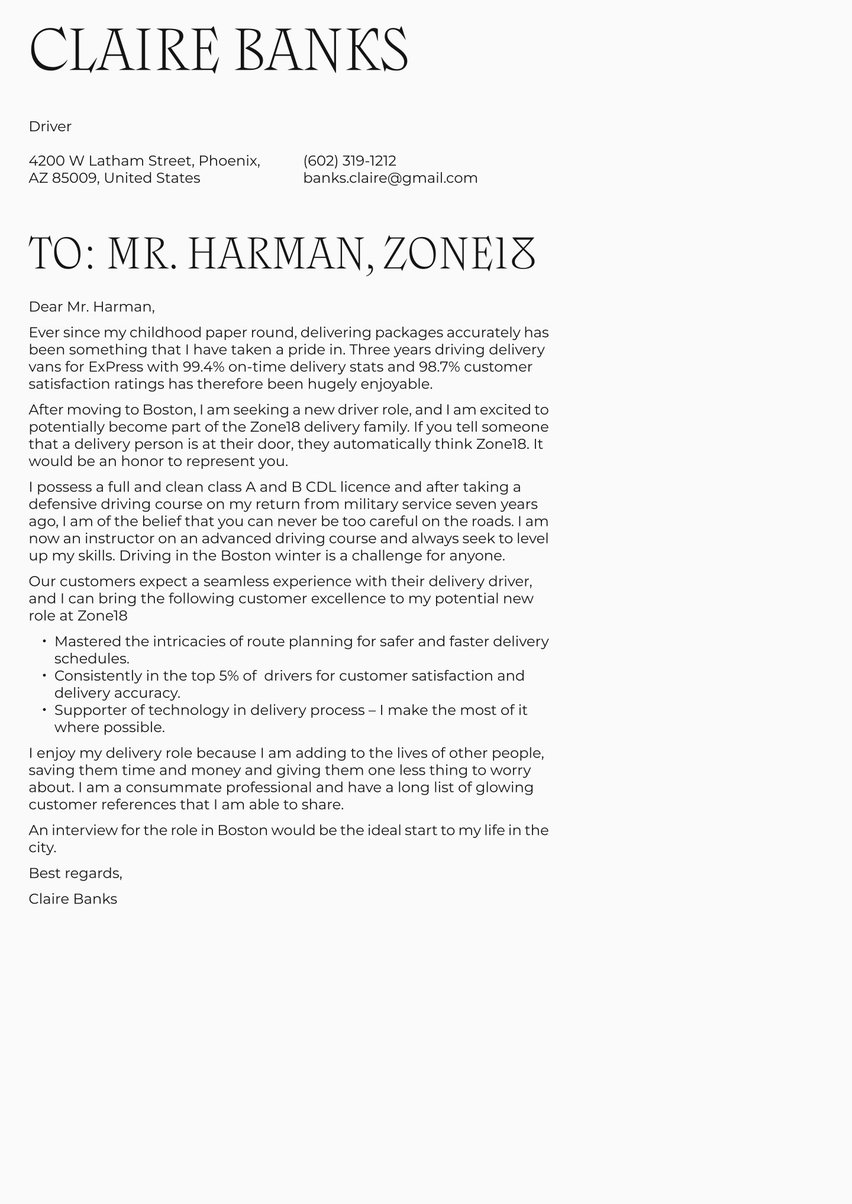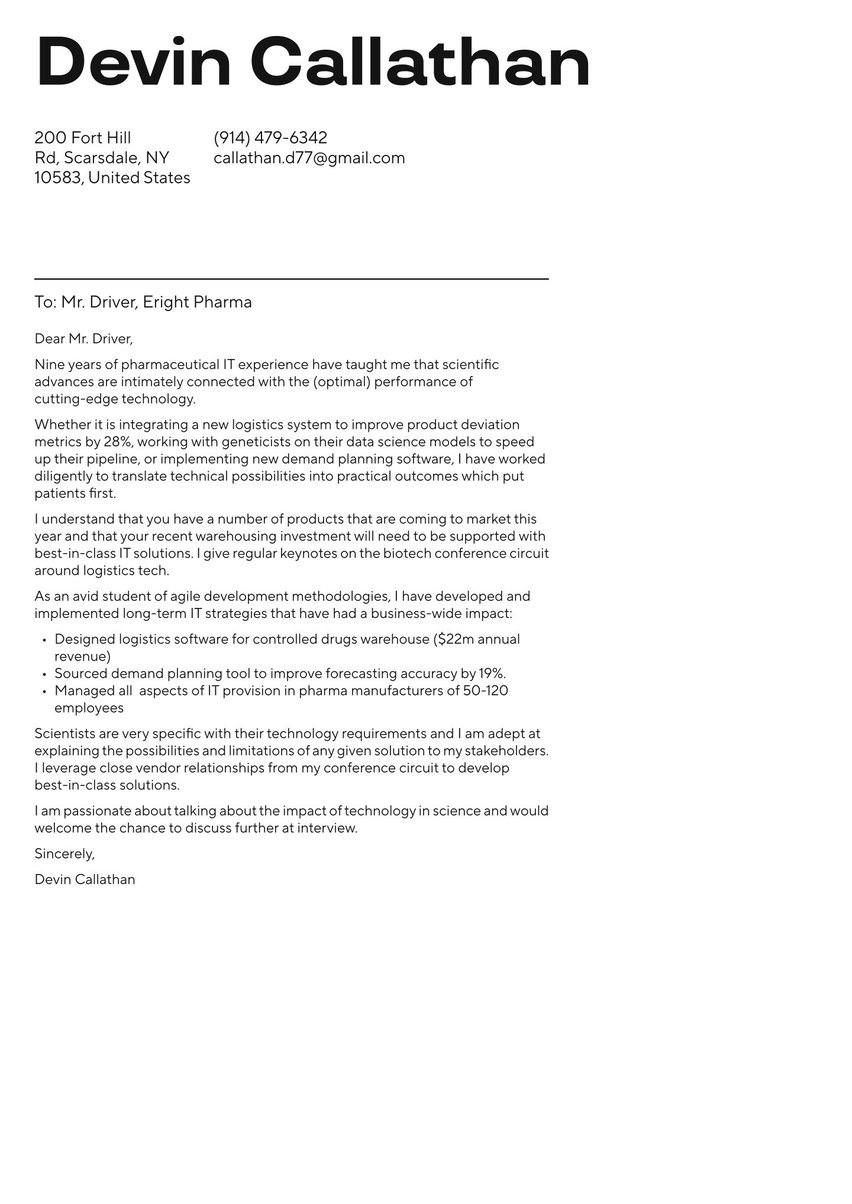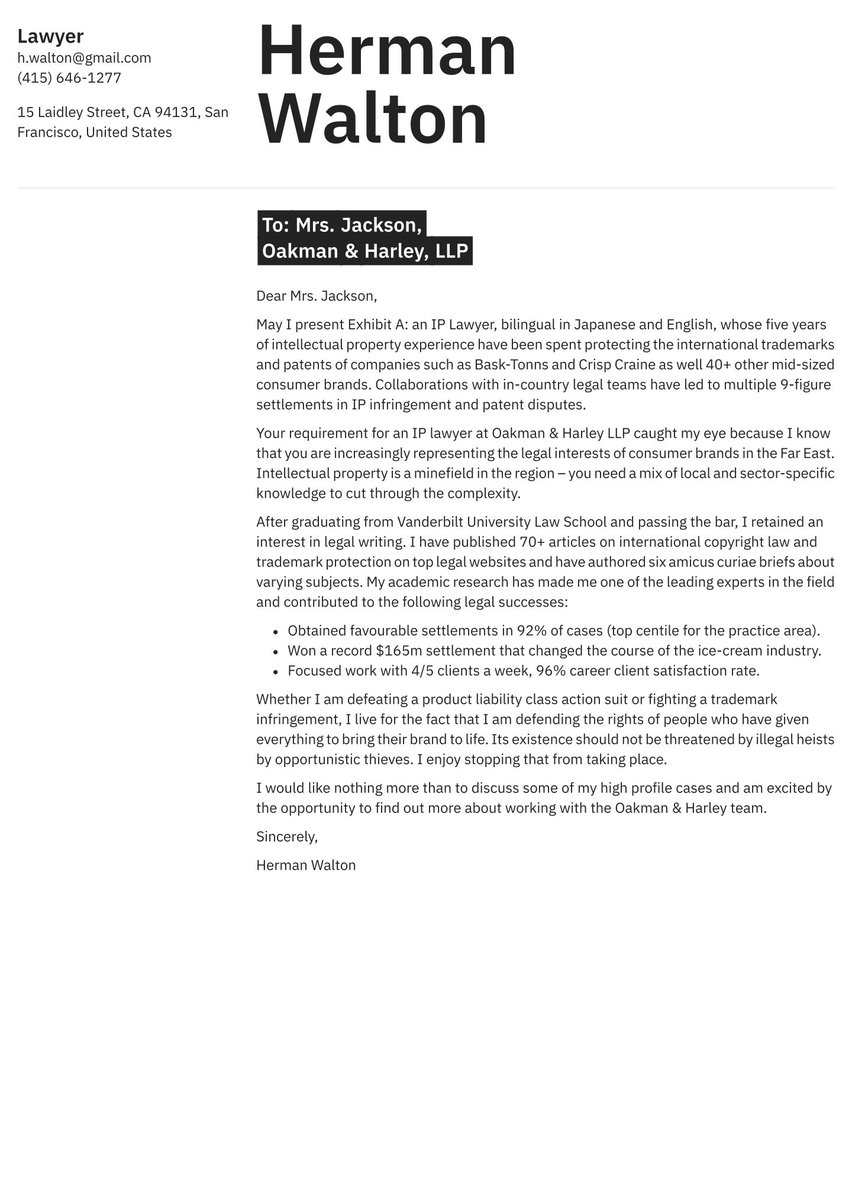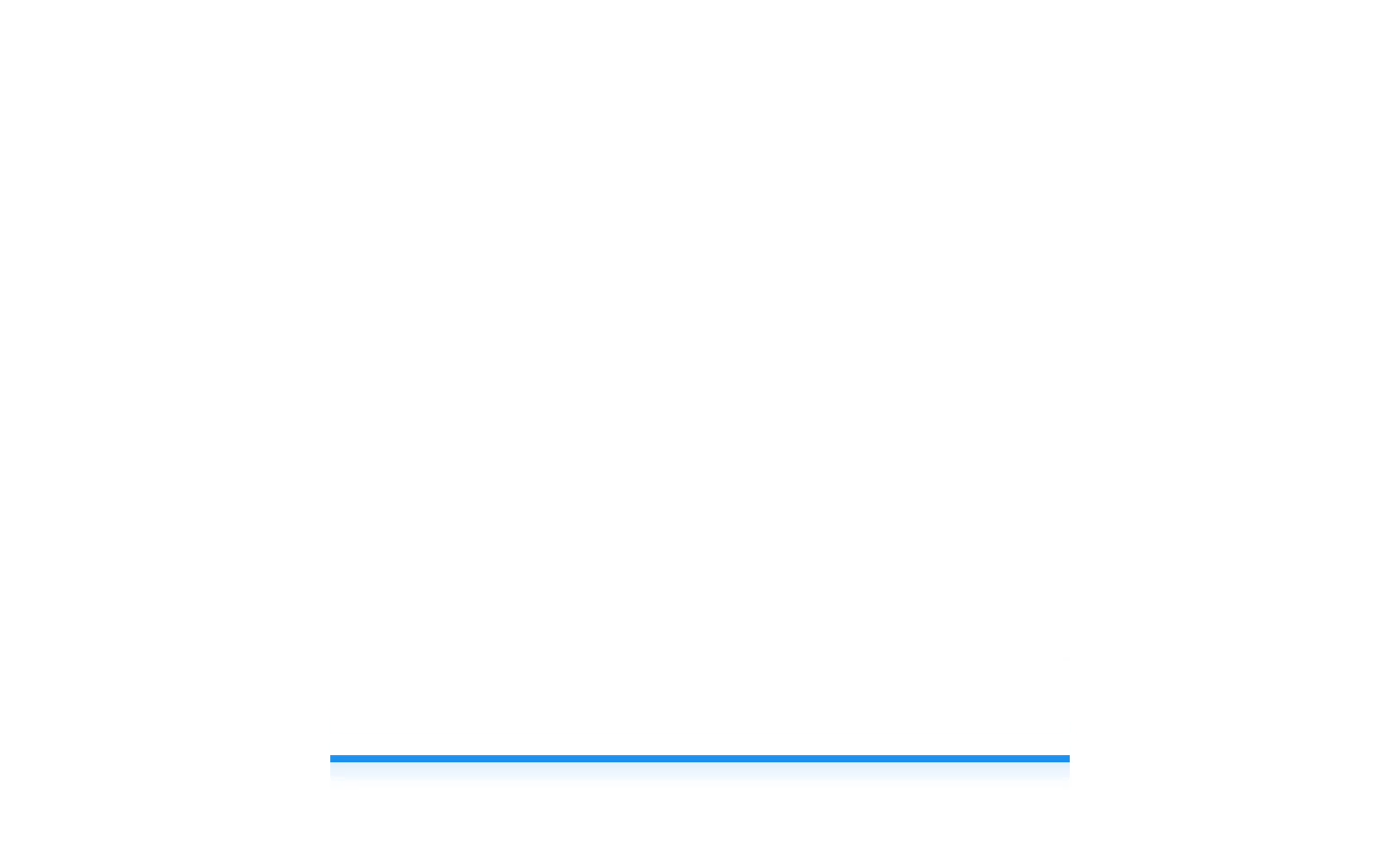When you are at the start of your career, writing a one-page cover letter might seem like a daunting prospect. You don’t have much work experience to share, so is it worth writing an entry-level cover letter at all?
A cover letter offers an opportunity to expand on the personal aspects and motivations of your application, so this is arguably more important for an entry-level candidate who is looking to share their “why.” The hiring manager won’t expect you to possess tons of experience, but they will want to hear about why you want the job.
An entry-level cover letter that is lacking personality is the first sign of an employee who doesn’t know where they are going and is likely to jump ship at the first sign of trouble.
At Resume.io, we explore the nuances of writing career documents for a wide range of professionals. Our library of cover letter examples covers a wide range of professions and is well worth a browse (depending on your desired industry). However, everyone needs to start somewhere, so this guide offers some more general advice.
How you begin your career can have a significant effect on your first decade in the workplace. Sell your potential as well as possible. In this blog, we look at
- How to format an entry-level cover letter.
- What to include in each cover letter section – structure your story.
- How to write an entry-level cover letter with absolutely no experience.
- Basic mistakes to avoid when composing the cover letter.
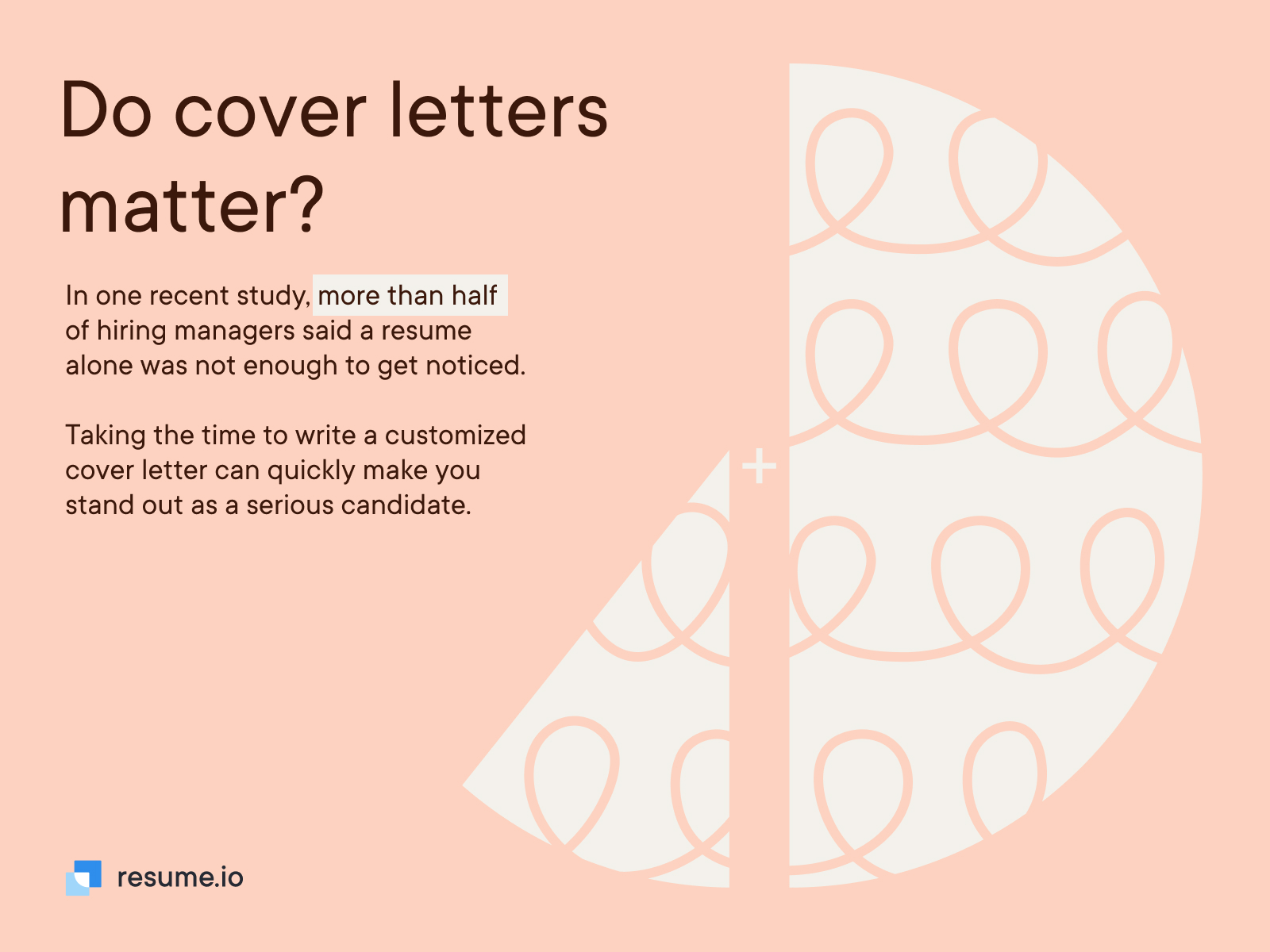
Best format for an entry-level cover letter
It might be said that a hiring manager could be more likely to read an entry-level cover letter than a resume. They will expect your resume to be somewhat threadbare, but your cover letter should be buzzing with personality and brimming with potential. Sure, it will read more like a career objective, but you need to get the hiring manager to buy into your dream.
Like any good sales document, you should set out your arguments into a simple format. Every entry-level cover letter should contain
- The cover letter header
- The greeting/salutation
- The cover letter intro
- The middle paragraphs (body of the letter)
- The ending paragraph of your cover letter (conclusion and call-to-action)
Rather than individual paragraphs for your motivations, personal background and future hopes, it is best to mix up your “fit” within a timeline of where you have been to where you are going. Put the potential job at the center of your arguments and think about the culture of your future employer when you share certain personality traits.
Our comprehensive cover letter guide has more information about the nuances of writing a cover letter. If you are wondering which font to use or whether your cover letter should repeat the details on your resume, it’s all there.
Check out our entry-level cover letter sample. Inspiration starts here:
Dear Mr. Vallant,
I am currently in the final year of high school and am looking for an entry-level weekend role to see me through college. I have experience in the gardening and landscaping sector and would relish the chance to serve customers at your garden center.
I am prepared to get involved and do any duties that are required of me. I understand that there is a lot of physical work involved with moving stock and arranging displays – as a keen sportsperson I would enjoy the physical challenge.
Consulting with customers and helping them make the right decisions is something that I have witnessed during my landscaping experience. I have taken on board much of the advice and look forward to building on my knowledge. Customers come to a garden center for solutions as well as products. As a marketing student, I always seek to find the most effective method of communicating with someone.
Several of my college friends have worked at your garden center previously. From all their positive impressions, it is the mix of experience and youth amongst your staff that attracts me the most. I am keen to learn from your amazing team.
My side interest in marketing technology and software may allow me to offer some ideas in terms of how you track the needs and habits of your customers. This is a project that I know is high on your agenda and I believe that I am well-equipped to help. I would welcome the opportunity of an interview to discuss this further.
Sincerely,
Chris Wrekin
Cover letter header
The cover letter header is the first thing that the hiring manager will notice. It should have an attractive design, but not detract from the message of your entry-level cover letter. Do not make the mistake of creating a visually stunning cover letter to mask a lack of experience.
Include your full name, email address, and phone number. You don’t have to include your full postal address (data protection issues) and you are no longer required to include the inside address of the employer. Your letter will be sent to them via email, not by post.
Make sure to include your contact details both on your cover letter and your resume. You never know when the hiring manager might decide to invite you to an interview.
Cover letter greeting
The greeting for an entry-level cover letter should be as respectful as any formal letter. It is likely that you won’t know the hiring manager, so beginning with a “Dear Mr./Mrs. Surname” is the safest option. You may want to adopt a friendly and conversational tone if you know the hiring manager personally, but other people may read the letter so stick with this convention.
If you are not sure to whom the cover letter should be addressed, phoning to check the correct name is not the worst option. It shows initiative and offers an opportunity to have a chat with the receptionist. Don’t bug them too much, but if you feel that they are in a chatty mood, you never know what you might be able to find out if you dig a little.
The final option is to address the team. “Dear Company Team” is a warm start to a cover letter and preferable to the old-fashioned “To Whom It May Concern.”
Cover letter introduction
When it comes to the cover letter introduction, you need to lead with your greatest value to the employer. This should be something tangible from any volunteering, internship, or work placement experience. Ideally, it should be relevant to the job in question.
While an entry-level cover letter should be packed with personality, you need to lead with something concrete to whet the hiring manager’s appetite. So many of your competitors will start by saying something fluffy and inspirational. Hopefully, you can do a little better. Pick a strong message and make the hiring manager take notice.
Dear Mr. Vallant,
I am currently in the final year of high school and am looking for an entry-level weekend role to see me through college. I have experience in the gardening and landscaping sector and would relish the chance to serve customers at your garden center.
Cover letter middle part (body)
The middle part of an entry-level cover letter should set you apart from the competition. This is the only way to elevate your candidacy to the point of securing an interview. There are various ways to do this, so let’s look at the sort of content you might share.
When writing, you should consider the sorts of transferable skills that the hiring manager will be looking for. They won’t expect too much as they know that they will be taking on a student, so tailor your story to their needs. Share a mix of work experience, academic excellence, interpersonal skills, and personal stories.
The most important thing about an entry-level cover letter is the sense that this first job is an important stepping-stone for your career. Many employers will hope that you take the next step internally, so don’t shy away from sharing your broader career aspirations. It may even be worth looking at the career progression of your potential future boss on LinkedIn. What did the early years of their career look like? Try to make connections wherever possible.
Organization and communication skills should feature prominently. Share some successes (with context) from your previous experience. Quantify your story where possible.
I am prepared to get involved and do any duties that are required of me. I understand that there is a lot of physical work involved with moving stock and arranging displays – as a keen sportsperson I would enjoy the physical challenge.
Consulting with customers and helping them make the right decisions is something that I have witnessed during my landscaping experience. I have taken on board much of the advice and look forward to building on my knowledge. Customers come to a garden center for solutions as well as products. As a marketing student, I always seek to find the most effective method of communicating with someone.
Several of my college friends have worked at your garden center previously. From all their positive impressions, it is the mix of experience and youth amongst your staff that attracts me the most. I am keen to learn from your amazing team.
Make sure that you impress the ATS software.
When employers expect to receive a large volume of applications, many employ Applicant Tracking Systems (ATS) to filter the applications. This software will process your cover letter and resume, slot you into a database, and even conduct the first round of selections.
If your cover letter does not contain the required number of keywords at this stage, a hiring manager may not get to read it at all. This is not to say that you should seek to mirror the job description, but your content should not be a million miles away. Use some of the job description terms if possible – that is what the ATS system will use as its reference point.
When drafting a cover letter, don’t be surprised if you write too much for the middle part. It is easier to cut sections out than scratch your head about what else to include. When editing, always imagine yourself in the position of the hiring manager. What would impress them?
How to close an entry-level cover letter (conclusion and sign-off)
The final part of an entry-level cover letter should end with a sense that there is much more to come. There is always a certain excitement when you hire an entry-level applicant as you know that their learning curve is going to be steep. If you have demonstrated that you are a safe pair of hands, the hiring manager will expect great things.
It is therefore perfectly acceptable to share your desire to find out more about the role during a potential interview. Don’t come across as presumptuous. Something like “I look forward to a potential meeting to find out more” will be fine. Injecting a sense of urgency with such a call to action may be effective – they will know that you will be applying to other roles.
My side interest in marketing technology and software may allow me to offer some ideas in terms of how you track the needs and habits of your customers. This is a project that I know is high on your agenda and I believe that I am well-equipped to help. I would welcome the opportunity of an interview to discuss this further.
Sincerely,
Chris Wrekin
Entry-level cover letter with no experience
It is clear that an entry-level applicant will not have much work experience, but it is unlikely that you will have zero work experience. Find a balance between writing a relevant cover letter for the job in question and including every single bit of work experience from the past five years. You will have done a lot of random stuff – you don’t have to include it all. Think about the following considerations:
- How can you make your volunteering and internships relevant for the role?
- Show that you understand the areas where you need to grow.
- How will your interpersonal skills impact your performance?
The good thing with an entry-level cover letter is that the expectations will be low. If you can manage to stand out in any number of ways, your chances of securing an interview will be high. Everyone has to start somewhere.
Basic mistakes in an entry-level application letter (and how to avoid them)
When a hiring manager does not have too much to judge, the presence of any mistakes will assume even more significance. Be careful to avoid the following:
- Check your grammar with an online checker such as Grammarly. Ask a friend to proofread the text and make sure that it sounds like you.
- Make sure that the cover letter is no longer than a page, but it should also be no shorter than 300 words. A few short lines will expose your inexperience.
- Don’t be overly formal. Attempting to seem like a consummate professional will be inauthentic. Write as you would speak during an interview.
Key takeaways
- Every entry-level applicant needs a cover letter to complement their resume
- Don’t repeat the resume – focus on your personality, and objectives and manufacture a compelling fit with the role.
- Research what the hiring manager is looking for – speak directly to them
- Get the visuals spot-on with our expert cover letter templates.
Have a look at some more cover letter examples:


